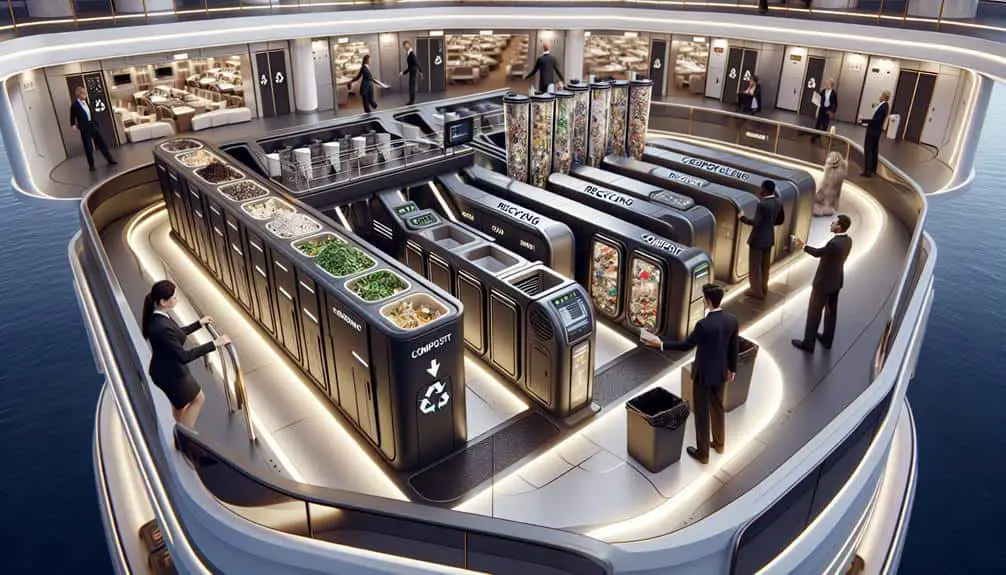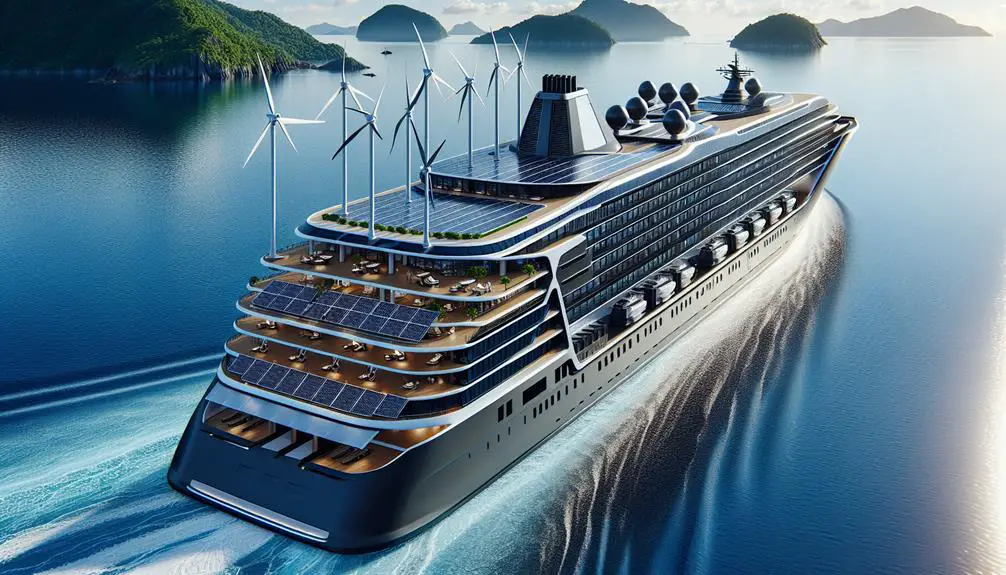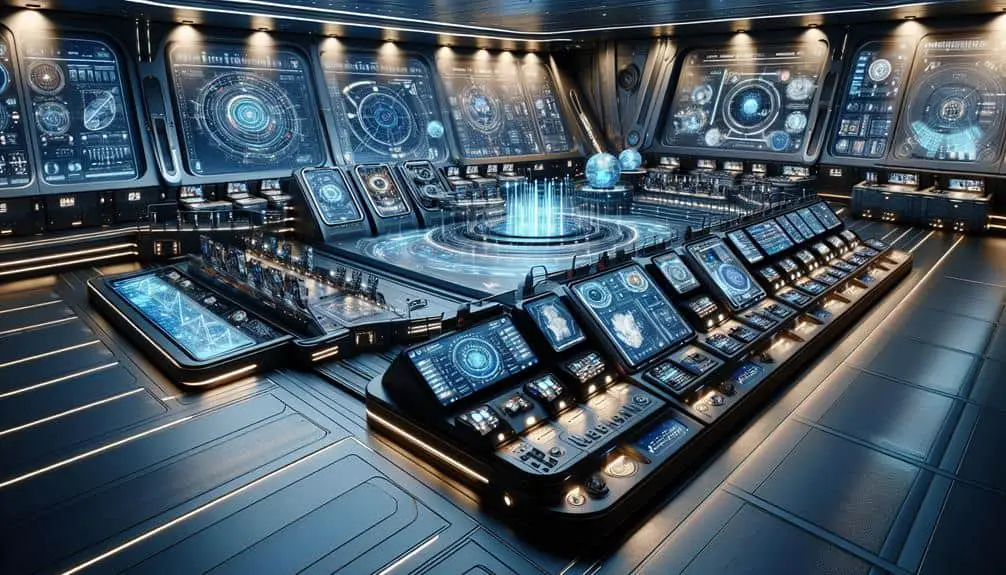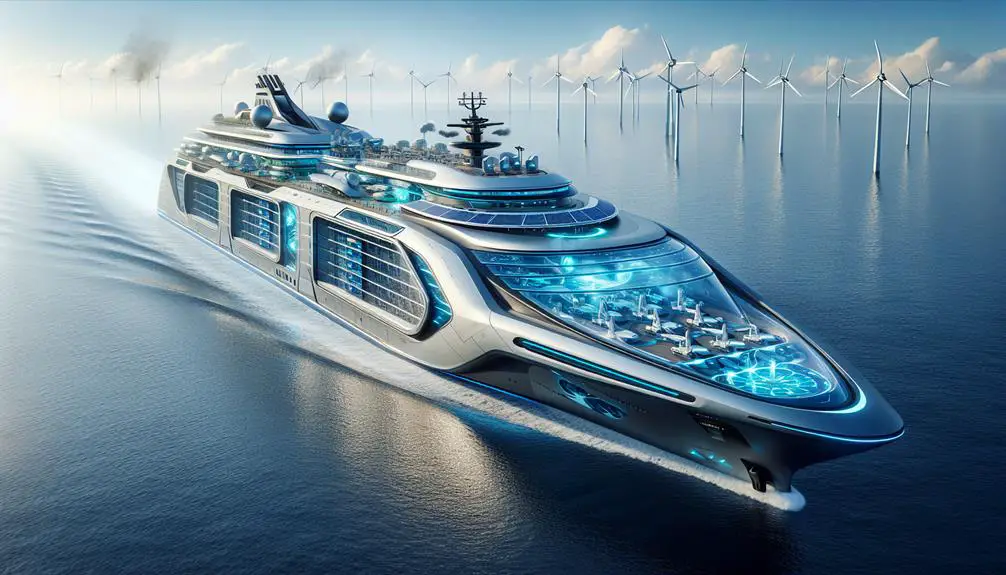Transform waste management on cruise ships by implementing smart sorting systems for efficient waste categorization and reduced contamination. Utilize advanced recycling technologies like optical sorting and plastic pyrolysis to convert waste into usable resources. Opt for waste-to-energy solutions to generate onboard energy and divert waste from landfills. Embrace digital monitoring and analytics for real-time optimization and tracking of sustainability goals. Establish green initiatives and partnerships to lead the charge in maritime sustainability. By adopting these innovative approaches, cruise ships can greatly reduce their environmental impact and set new standards in waste management practices.
Key Points
- Implement smart sorting systems for efficient waste categorization.
- Utilize advanced recycling technologies like optical sorting and plastic pyrolysis.
- Adopt waste-to-energy solutions to convert waste into useful onboard energy.
- Utilize digital monitoring and analytics for optimized waste management strategies.
- Collaborate with green initiatives and partners to lead in sustainable waste management practices.
Smart Sorting Systems
Implementing advanced waste sorting technologies on cruise ships can greatly enhance sustainability efforts and streamline waste management processes. Automated sorting systems offer a solution that aligns with sustainable practices by efficiently categorizing waste for proper disposal or recycling.
By incorporating automated sorting systems on cruise ships, the process of separating recyclables, organic waste, and general waste becomes more accurate and less labor-intensive. These systems use sensors and artificial intelligence to identify the type of waste, making the sorting process faster and more effective. This not only minimizes the chances of contamination but also guarantees that recyclable materials are properly handled.
The implementation of such advanced technologies not only improves the overall waste management system but also contributes to the cruise industry's sustainability goals. By promoting sustainable practices through efficient waste sorting, cruise ships can minimize their environmental footprint and work towards a cleaner and greener future for the seas they navigate.
Advanced Recycling Technologies
Utilizing cutting-edge recycling technologies enhances waste management efficiency and sustainability practices on cruise ships. Embracing recycling innovations and sustainable practices can greatly reduce environmental impact and contribute to a greener cruising experience.
Here are four advanced recycling technologies that are revolutionizing waste management on cruise ships:
- Optical Sorting Systems: These systems use advanced sensors and sorting algorithms to automatically separate different types of recyclable materials, increasing the efficiency of the recycling process.
- Plastic Pyrolysis Technology: By converting plastic waste into fuel through pyrolysis, cruise ships can reduce the volume of plastic waste onboard while creating a valuable resource.
- Closed-Loop Recycling Systems: Implementing closed-loop systems allows cruise ships to recycle materials such as glass, metal, and paper onboard, minimizing the need to dispose of waste at ports and landfills.
- Organic Waste Digesters: These innovative systems break down organic waste into compost or biogas through biological processes, promoting circular economy principles and reducing greenhouse gas emissions.
Waste-to-Energy Solutions
To enhance waste management efficiency and promote sustainability aboard cruise ships, exploring waste-to-energy solutions presents a promising avenue for reducing environmental impact and optimizing resource utilization. Waste-to-energy solutions involve converting various types of waste generated on cruise ships into energy through processes like incineration, gasification, or pyrolysis. By implementing these technologies, cruise ships can't only reduce the volume of waste that needs to be disposed of but also generate energy that can be used to power onboard operations. This dual benefit contributes to both waste reduction and energy generation, aligning with sustainable practices.
One key advantage of waste-to-energy solutions is the potential to lessen the environmental footprint of cruise ships by diverting waste from landfills and simultaneously producing useful energy. By turning waste into a valuable resource, cruise ships can become more self-sufficient and environmentally friendly. Additionally, waste-to-energy solutions present a proactive approach to waste management, transforming a potential problem into a sustainable energy source. By embracing these innovative technologies, cruise ships can move closer to achieving their waste management and sustainability goals.
Digital Monitoring and Analytics
Digital monitoring and analytics play a crucial role in enhancing waste management efficiency and sustainability practices aboard modern cruise ships. By implementing real-time tracking systems and advanced data visualization tools, cruise lines can optimize their waste management strategies and make informed decisions based on accurate data.
Here are four key ways digital monitoring and analytics revolutionize waste management on cruise ships:
- Efficient Resource Allocation: Real-time tracking allows for the monitoring of waste generation rates, enabling crews to allocate resources effectively and streamline collection processes.
- Identification of Trends: Data visualization tools help identify patterns and trends in waste production, aiding in the development of targeted waste reduction initiatives.
- Preventative Maintenance: Digital monitoring can detect equipment malfunctions early, facilitating proactive maintenance to prevent breakdowns and minimize disruptions in waste management operations.
- Performance Monitoring: By analyzing data metrics, cruise operators can assess the performance of waste management initiatives, identify areas for improvement, and track progress towards sustainability goals.
Green Initiatives and Partnerships
Enhancing waste management practices on cruise ships involves embracing green initiatives and forming strategic partnerships to foster sustainability and environmental stewardship. Eco-friendly collaborations with organizations specializing in waste reduction and recycling can have a substantial impact on the environmental footprint of cruise operations. By implementing sustainable practices such as source reduction, recycling programs, and waste-to-energy initiatives, cruise lines can minimize their impact on the oceans and coastal areas they visit.
Strategic partnerships with waste management companies, environmental NGOs, and government agencies can provide cruise ships with access to innovative technologies and best practices in waste reduction. These partnerships can also facilitate the development of tailored waste management plans that align with local regulations and global sustainability goals.
Through eco-friendly collaborations and sustainable practices, cruise ships can lead the way in revolutionizing waste management in the maritime industry. By prioritizing environmental stewardship and embracing green initiatives, cruise lines can set new standards for sustainability and inspire others to follow suit.
Frequently Asked Questions
How Do Cruise Ships Prevent Waste From Impacting Marine Ecosystems During Their Voyages?
To prevent waste from harming marine ecosystems during voyages, cruise ships implement innovative technologies and green initiatives. They use advanced waste management systems to recycle and treat waste onboard, ensuring sustainability and environmental protection.
Are There Any Regulations or International Standards in Place to Ensure Sustainable Waste Management Practices Are Followed on Cruise Ships?
You may think regulations alone suffice, but sustainability initiatives complement them. Cruise ships adhere to strict regulations and embrace innovative sustainability practices. By integrating both, they guarantee responsible waste management and safeguard marine ecosystems effectively.
What Measures Are Taken to Minimize Food Waste on Cruise Ships?
To minimize food waste on cruise ships, innovative technologies and composting practices are utilized. By implementing efficient inventory management systems and engaging guests in responsible consumption habits, the cruise industry can considerably reduce its environmental impact.
How Are Hazardous Materials, Such as Chemicals and Batteries, Disposed of Onboard Cruise Ships?
Do you know how hazardous materials, like chemicals and batteries, are managed on cruise ships? Chemicals are disposed of through proper storage and disposal procedures, while batteries are recycled to reduce environmental impact and promote sustainability.
What Steps Are Cruise Lines Taking to Educate Passengers and Crew Members About the Importance of Responsible Waste Management?
Cruise lines are enhancing crew training to boost waste reduction efforts onboard. Passengers are engaged through educational programs on responsible waste management. Recycling initiatives are steadily increasing, creating a more sustainable environment for all aboard.




